#Jubilee Synagogue
Text
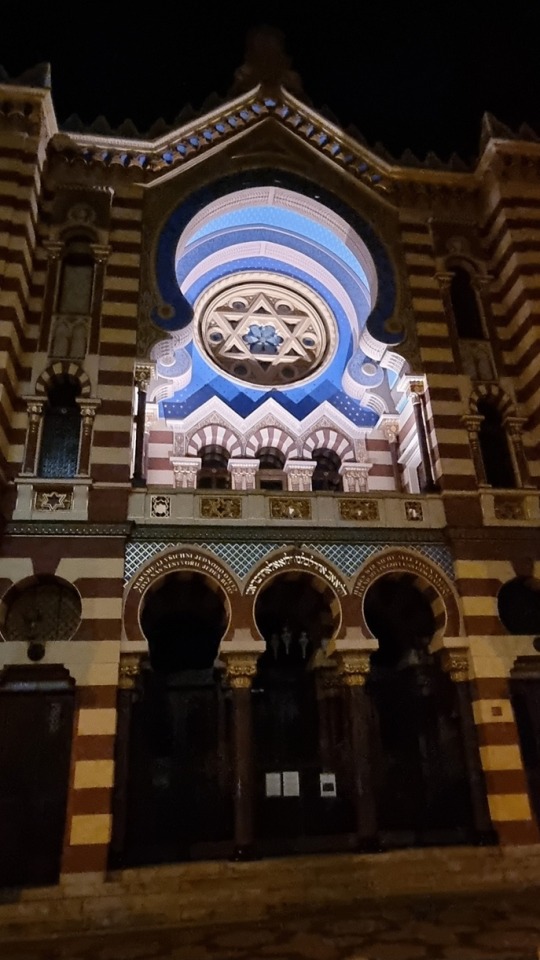
Jerusalem Synagogue, Prague
Jeruzalémská synagoga, Praha
בית כנסת היובל בפראג, פראג
Jerusalemsynagoge, Prag
Иерусалимская синагога, Прага
Synagogue de Jérusalem, Prague
#Jeruzalémská synagoga#בית כנסת היובל בפראג#Jerusalemsynagoge#Иерусалимская синагога#Synagogue de Jérusalem#Jubilee Synagogue#Jerusalem Synagogue#Jubilejní synagoga#Jubilejní synagoga císaře Františka Josefa I.#Юбилейная синагога#Synagoga Jerozolimska#synagoga Jubileuszowa#synagogue du Jubilé#禧年会堂#November 2023#Jeruzalémská#Praha#Nové Město#Prag#Neustadt#Прага#Prague#Czech Republic#Staré Město#Česká republika#Altstadt#Tschechien#Чешская Республика#République tchèque#República Tcheca
2 notes
·
View notes
Text
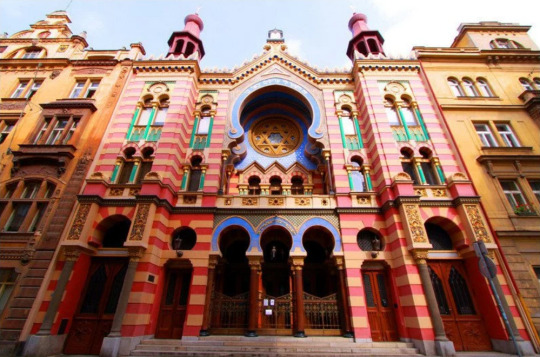
#Jubilee Synagogue#also known as the Jerusalem Synagogue for its location on Jerusalem Street#is an active synagogue in Prague#Czech Republic. It was built in 1906#designed by Wilhelm Stiassny and named in honor of the silver Jubilee of Emperor Franz Joseph I of Austria.
6 notes
·
View notes
Text
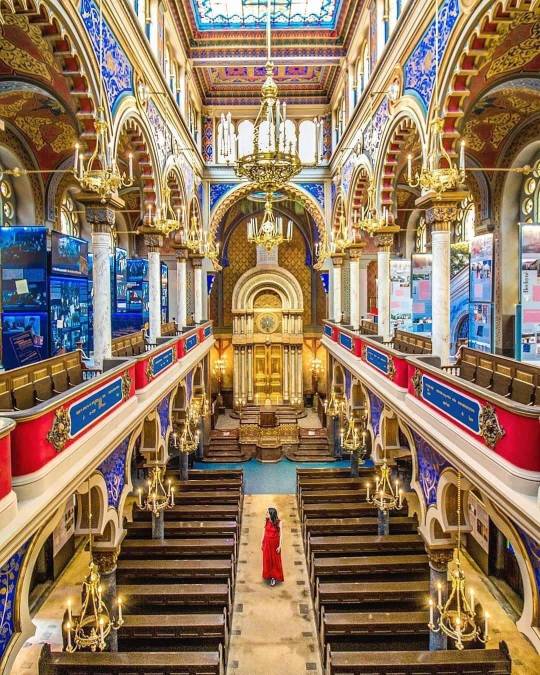
JUBILEE SYNAGOGUE - CZECH REPUBLIC
66 notes
·
View notes
Text
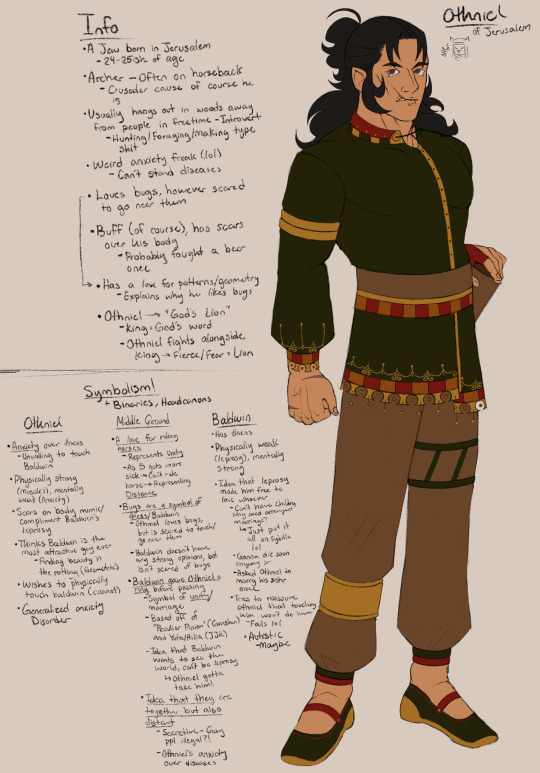
Made a ref for Othniel a few months back, decided to post since I wasn’t gonna finish
He’s my KoH oc basically… and is Baldwins Persian, Jewish, and homeless (not really) lover (I know pls don’t boo me off tumblr)
You can read all the stuff I wrote, it has a lot to do with how Othniel and Baldwin kinda relate to each other
I forgot to note that his design is based off of: Jubilee Synagogue (Czechia), Central Synagogue (New York), and the Spiny Flower Mantis
22 notes
·
View notes
Text
To my followers in the U.K.:
I hope that you have a wonderful time during the Jubilee festivities over the next several days. I do wish that i could be there with you!
(Although actually, there is this problem that I'd have to deal with; one London synagogue is doing so this way.)
2 notes
·
View notes
Text
Events 4.11 (after 1970)
1970 – Apollo Program: Apollo 13 is launched.
1976 – The Apple I is created.
1977 – London Transport's Silver Jubilee AEC Routemaster buses are launched.
1979 – Ugandan dictator Idi Amin is deposed.
1981 – A massive riot in Brixton, south London results in almost 300 police injuries and 65 serious civilian injuries.
1986 – FBI Miami Shootout: A gun battle in broad daylight in Dade County, Florida between two bank/armored car robbers and pursuing FBI agents. During the firefight, FBI agents Jerry L. Dove and Benjamin P. Grogan were killed, while five other agents were wounded. As a result, the popular .40 S&W cartridge was developed.
1987 – The London Agreement is secretly signed between Israeli Foreign Affairs Minister Shimon Peres and King Hussein of Jordan.
1990 – Customs officers in Middlesbrough, England, seize what they believe to be the barrel of a massive gun on a ship bound for Iraq.
1993 – Four hundred fifty prisoners rioted at the Southern Ohio Correctional Facility in Lucasville, Ohio, and continued to do so for ten days, citing grievances related to prison conditions, as well as the forced vaccination of Nation of Islam prisoners (for tuberculosis) against their religious beliefs.
2001 – The detained crew of a United States EP-3E aircraft that landed in Hainan, China after a collision with a J-8 fighter, is released.
2002 – The Ghriba synagogue bombing by al-Qaeda kills 21 in Tunisia.
2002 – Over two hundred thousand people march in Caracas towards the presidential palace to demand the resignation of President Hugo Chávez. Nineteen protesters are killed.
2006 – Iranian president Mahmoud Ahmadinejad announces Iran's claim to have successfully enriched uranium.
2007 – Algiers bombings: Two bombings in Algiers kill 33 people and wound a further 222 others.
2008 – Kata Air Transport Flight 007 crashes while attempting an emergency landing at Chișinău International Airport, killing eight.
2011 – An explosion in the Minsk Metro, Belarus kills 15 people and injures 204 others.
2012 – A pair of great earthquakes occur in the Wharton Basin west of Sumatra in Indonesia. The maximum Mercalli intensity of this strike-slip doublet earthquake is VII (Very strong). Ten are killed, twelve are injured, and a non-destructive tsunami is observed on the island of Nias.
2018 – An Ilyushin Il-76 which was owned and operated by the Algerian Air Force crashes near Boufarik, Algeria, killing 257.
2021 – Twenty year old Daunte Wright is shot and killed in Brooklyn Center, Minnesota by officer Kimberly Potter, sparking protests in the city, when the officer allegedly mistakes her own gun for her taser.
2023 – During the Pazigyi massacre, an airstrike conducted by the Myanmar Air Force kills at least 100 villagers in Pazigyi, Sagaing Region.
0 notes
Text
Jesus' Manifesto Part 1
Luke 4:18-19
The UK news media is buzzing at present with speculation as to when the next UK general election will take place.
Once the date is announced the politicians will be delivering their manifestos to entice the electorate to vote for them and their party.
The manifesto contains the promises of what the politician intends to perform If the people elects them.
In a sense that is what Jesus did in in the scripture Luke 4:18-19 which you could say was his manifesto, or his mission, or his agenda, or his platform, or even as his job description but please note his manifesto was based exclusively on the will of Father God as described in the Holy Scriptures.
A what a wonderful manifesto it was, no one has before or since gave such wonderful promises to humankind as Jesus did in his manifesto.
And unlike many politicians, Jesus delivered, then and now, each and every promise in his manifesto. PTL.
Context of Luke 4:18-19
Luke 4:16 So He came to Nazareth, where He had been brought up. And as His custom was, He went into the synagogue on the Sabbath day, and stood up to read. 17 And He was handed the book of the prophet Isaiah. And when He had opened the book, He found the place where it was written:
Jesus’ Manifesto
18 The Spirit of the Lord is upon Me, Because He has anointed Me To preach the gospel to the poor; He has sent Me to heal the broken-hearted, To proclaim liberty to the captives, And recovery of sight to the blind, To set at liberty those who are oppressed.
19 To proclaim the acceptable year of the Lord.
Jesus was anointed (saturated) with the Holy Spirit to fulfil the specific purposes for which the Father God had sent him.
Each point Jesus makes is part of the wonderful news in his manifesto.
1.To preach the Gospel the good news of salvation to the poor. The poor* being everyone who was as sinner and had no way of obtaining forgiveness of their sins and
receiving God’s salvation. * biblically =dependent on others i.e. spiritually speaking to us all.
2. To heal the broken hearted- one of the Teen Challenge (addiction recovery) leaders explained to me that everyone who has addiction problems has had a broken heart in their relationships in life.
Many other people have had their hearts broken too in their life relationships and experiences but without addiction.
Jesus came specifically to bind up the broken hearts to restore meaning, purpose, and wholeness to our lives.
Remember Matthew 12:20 A bruised reed He will not break, And smoking flax He will not quench, Till He sends forth justice to victory; (Isa 42:3) when we feel that we are hanging by a thread or that our candle flame is going to go out. Jesus binds up our strands and breathes his oxygen onto our flames.
The wonderful news in Jesus’ manifesto continues.
3. Jesus came to set people free from the bondage and slavery of sin which takes them captive at will.
The believer no longer is at the whim of sin but can stand against it in using the full panoply of armour of God and the weapons Jesus has given us.
Jesus came to remove all our guilt, and shame-these are often Satan’s weapons to hold us back from serving God.
4. Not only did Jesus often heal the physical blindness in his earthly ministry but more importantly took away the blindness of the unbelievers when we were saved into God’s Kingdom. Remember the hymn line from ‘Amazing grace’: ‘I once was blind but now I see.’
That was you and I until we became believers.
5. Jesus came to set at liberty those who are oppressed by the devil, those held down from living their lives to the full by demonic oppression in its various manifestations.
v19 The acceptable year of the Lord refers to the Jubilee year (50th) of the Lord in which land was returned to the original owner, all debts were forgiven, slaves were released- these are good parallels in the life of the believers when we are first saved.
The Jubilee year was the year of redemption, Jesus announced that He was bringing full scale redemption to humankind in his manifesto.
Amen
Personal Prayer
In part 2 we consider the words that Jesus read from Isaiah 61:1-2
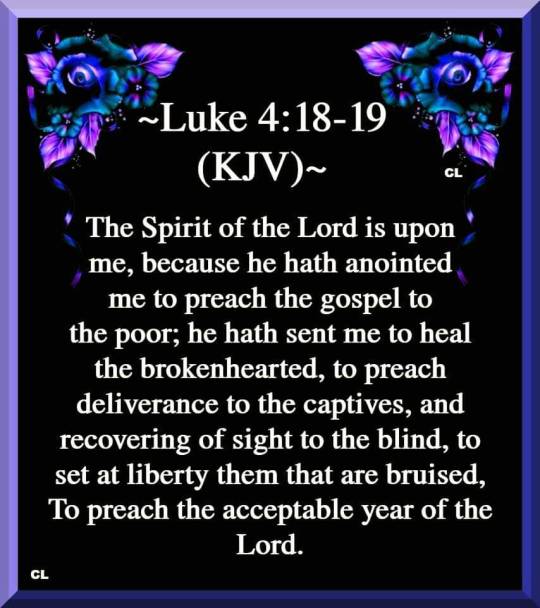
#christianity#bible study#bibletruth#blog post#blessings#psalmonesermons#faith#victory#devotional#jesus manifesto 1/4
0 notes
Text
Luke 4:19, 'To proclaim the acceptable year of the Lord.'
This scripture had been written prophetically by the prophet Isaiah about 650 years prior to this time. It was read in Jewish synagogues thousands of times. But the one this verse was speaking of had never spoken it before. With this pronouncement, Jesus began the year of Jubilee.The Year of Jubilee was described in Leviticus 25. It was a year when everyone left their fields unworked and kept a…
View On WordPress
0 notes
Text
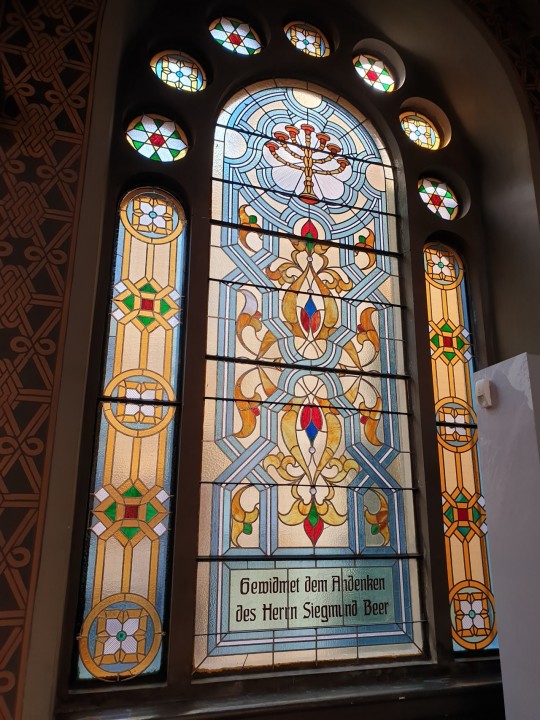
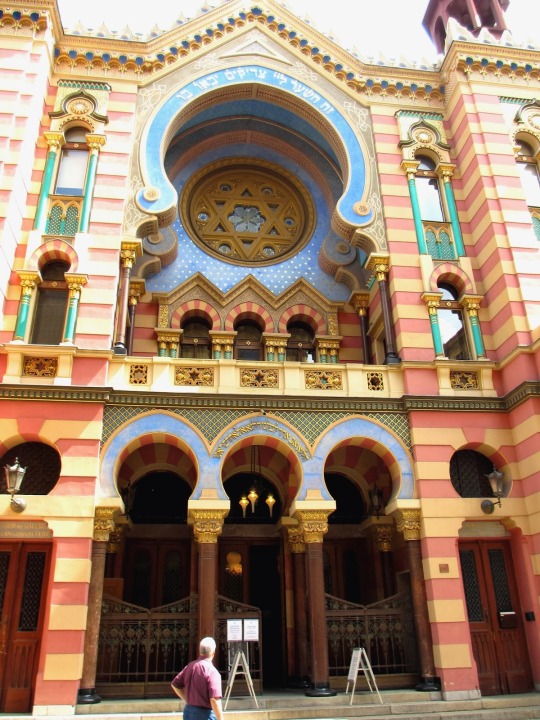
Jubilee or Jerusalem Synagogue - Prague
The Jubilee Synagogue in Prague, Czech Republic, was built in 1905 and I've read it was named in honor of the silver jubilee (25 years) of Emperor Franz Joseph of Austria. However, Franz Joseph celebrated his silver jubilee on December 2, 1873. In Judaism a jubilee is 50 years and the jubilee of Franz Joseph, in a Jewish sense, was in 1898. If construction was started in that year and later completed, that could account for the odd number of years. In fact, it was in 1898 when it was decided to build a new synagogue to replace three synagogues demolished during reconstruction of the Jewish Town. An old house was purchased on Jerusalem Street in 1899 as a site for the synagogue. The Jubilee synagogue is also known as the Jerusalem Synagogue, because of its location on Jerusalem Street.
0 notes
Text

Jubilee Synagogue (Czech: Jubilejní synagoga), also known as the Jerusalem Synagogue (Czech: Jeruzalémská synagoga) for its location on Jerusalem Street, is an active synagogue in Prague, Czech Republic. It was built in 1906, designed by Wilhelm Stiassny and named in honor of the silver Jubilee of Emperor Franz Joseph I of Austria. Although originally built as a "reform" synagogue (with an organ and a choir), it is nowadays used by the more traditional ("modern orthodox") members of the Prague Jewish community, aligning itself officially with orthodox Judaism. Still, compared to the famous other active synagogue of Prague, the Old-New Synagogue, the Jubilee Synagogue is far less stringent in many ways.
0 notes
Text
Isaiah 61: Year of the Jubilee
When Jesus began his ministry, it is the first two verses of this chapter that he read aloud in synagogue, saying "Today this scripture has been fulfilled in your hearing."
#Jubilee #Isaiah61 #YearofGodsFavor
Have any of you ever met a warrior?
There are many men and woman who really do have the “blood of justice on their garments,” soldiers, police officers, guards … warriors. Have ever had an opportunity to listen to their stories, what it took to fulfill their mission, the heartache, the strength and courage, to be the ones in front, protecting all the rest of us from evil? For the love of…

View On WordPress
#deuteronomy 15#Deuteronomy 6:4#isaiah 6:1#John 3:16#jubilee#laeviticus 25#luke 4:20-21#matthew 3:17#year of God&039;s favor#year of the lord&039;s favor
0 notes
Text
A fulfillment of what was written:
“The synagogue attendant gave Him the scroll of the prophet Isaiah, and Jesus unrolled it to the place where Isaiah had written these words”
The coming of the heavenly Son to earth
Wisdom is the “pure gold” of the heart
Today’s reading of the Scriptures from the New Testament is the 4th chapter of the book of Luke that begins with a note from The Voice translation:
While genealogies may seem tedious, for people in many cultures (including Luke’s), genealogies are important and meaningful because they give a sense of identity and history. Luke places Jesus in the mainstream of biblical history, connected to King David, Abraham, Noah, and Adam. By connecting Jesus with Adam, and ultimately with God, Luke shows how Jesus is connected to and relevant for all people, and he may also be suggesting that in Jesus God is launching a new humanity, with Jesus as the new Adam. Unlike the first Adam, though, Jesus will be completely faithful to God, as the next episode makes clear. Perhaps echoing Adam and Eve being tempted by the serpent in the garden (Genesis 3:1–7), Luke moves from the stories of Jesus’ beginnings to His temptation.
[Luke 4]
When Jesus returned from the Jordan River, He was full of the Holy Spirit, and the Holy Spirit led Him away from the cities and towns and out into the desert.
For 40 days, the Spirit led Him from place to place in the desert, and while there, the devil tempted Jesus. Jesus was fasting, eating nothing during this time, and at the end, He was terribly hungry. At that point, the devil came to Him.
Devil: Since You’re the Son of God, You don’t need to be hungry. Just tell this stone to transform itself into bread.
Jesus: It is written in the Hebrew Scriptures, “People need more than bread to live.”
Then the devil gave Jesus a vision. It was as if He traveled around the world in an instant and saw all the kingdoms of the world at once.
Devil: All these kingdoms, all their glory, I’ll give to You. They’re mine to give because this whole world has been handed over to me. If You just worship me, then everything You see will all be Yours. All Yours!
Jesus: [Get out of My face, Satan!] The Hebrew Scriptures say, “Worship and serve the Eternal One your God—only Him—and nobody else.”
Then the devil led Jesus to Jerusalem, and he transported Jesus to stand upon the pinnacle of the temple.
Devil: Since You’re the Son of God, just jump. Just throw Yourself into the air. You keep quoting the Hebrew Scriptures. They themselves say,
He will put His heavenly messengers in charge of You,
to keep You safe in every way.
And,
They will hold You up in their hands
so that You do not smash Your foot against a stone.
Jesus: Yes, but the Hebrew Scriptures also say, “You will not presume on God; you will not test the Lord, the one True God.”
The devil had no more temptations to offer that day, so he left Jesus, preparing to return at some other opportune time.
Jesus returned to Galilee in the power of the Holy Spirit, and soon people across the region had heard news of Him. He would regularly go into their synagogues and teach. His teaching earned Him the respect and admiration of everyone who heard Him.
He eventually came to His hometown, Nazareth, and did there what He had done elsewhere in Galilee—entered the synagogue and stood up to read from the Hebrew Scriptures.
The synagogue attendant gave Him the scroll of the prophet Isaiah, and Jesus unrolled it to the place where Isaiah had written these words:
The Spirit of the Lord the Eternal One is on Me.
Why? Because the Eternal designated Me
to be His representative to the poor, to preach good news to them.
He sent Me to tell those who are held captive that they can now be set free,
and to tell the blind that they can now see.
He sent Me to liberate those held down by oppression.
In short, the Spirit is upon Me to proclaim that now is the time;
this is the jubilee season of the Eternal One’s grace.
Jesus rolled up the scroll and returned it to the synagogue attendant. Then He sat down, as a teacher would do, and all in the synagogue focused their attention on Jesus, waiting for Him to speak. He told them that these words from the Hebrew Scriptures were being fulfilled then and there, in their hearing.
At first everyone was deeply impressed with the gracious words that poured from Jesus’ lips. Everyone spoke well of Him and was amazed that He could say these things.
Everyone: Wait. This is only the son of Joseph, right?
Jesus: You’re about to quote the old proverb to Me, “Doctor, heal yourself!” Then you’re going to ask Me to prove Myself to you by doing the same miracles I did in Capernaum. But face the truth: hometowns always reject their homegrown prophets.
Think back to the prophet Elijah. There were many needy Jewish widows in his homeland, Israel, when a terrible famine persisted there for three and a half years. Yet the only widow God sent Elijah to help was an outsider from Zarephath in Sidon.
It was the same with the prophet Elisha. There were many Jewish lepers in his homeland, but the only one he healed—Naaman—was an outsider from Syria.
The people in the synagogue became furious when He said these things. They seized Jesus, took Him to the edge of town, and pushed Him right to the edge of the cliff on which the city was built. They would have pushed Him off and killed Him, but He passed through the crowd and went on His way.
Next He went to Capernaum, another Galilean city. Again He was in the synagogue teaching on the Sabbath, and as before, the people were enthralled by His words. He had a way of saying things—a special authority, a unique power.
In attendance that day was a man with a demonic spirit.
Demon-Possessed Man (screaming at Jesus): Get out of here! Leave us alone! What’s Your agenda, Jesus of Nazareth? Have You come to destroy us? I know who You are: You’re the Holy One, the One sent by God!
Jesus (firmly rebuking the demon): Be quiet. Get out of that man!
Then the demonic spirit immediately threw the man into a fit, and he collapsed right there in the middle of the synagogue. It was clear the demon had come out, and the man was completely fine after that. Everyone was shocked to see this, and they couldn’t help but talk about it.
Synagogue Members: What’s this about? What’s the meaning of this message? Jesus speaks with authority, and He has power to command demonic spirits to go away.
The excitement about Jesus spread into every corner of the surrounding region.
Picture this:
Jesus then leaves that synagogue and goes over to Simon’s place. Simon’s mother-in-law is there. She is sick with a high fever. Simon’s family asks Jesus to help her.
Jesus stands over her, and just as He had rebuked the demon, He rebukes the fever, and the woman’s temperature returns to normal. She feels so much better that she gets right up and cooks them all a big meal.
By this time, it’s just before nightfall, and as the sun sets, groups of families, friends, and bystanders come until a huge crowd has gathered. Each group has brought along family members or friends who are sick with any number of diseases. One by one, Jesus lays His hands on them and heals them. On several occasions, demonic spirits are expelled from these people, after shouting at Jesus, “You are the Son of God!”
Jesus always rebukes them and tells them to be quiet. They know He is the Anointed One, but He doesn’t want to be acclaimed in this way.
The next morning, Jesus sneaks away. He finds a place away from the crowds, but soon they find Him. The crowd tries their best to keep Him from leaving.
Jesus: No, I cannot stay. I need to preach the kingdom of God to other cities too. This is the purpose I was sent to fulfill.
So He proceeds from synagogue to synagogue across Judea, preaching His message of the kingdom of God.
The Book of Luke, Chapter 4 (The Voice)
A note from The Voice translation:
The essential message of Jesus can be summed up this way: the kingdom of God is available to everyone, starting now. When Jesus refers to the kingdom of God, He doesn’t mean something that happens after death, far off in heaven; He equates the kingdom of God with God’s will being done on earth as it is in heaven. So the kingdom of God is life as God intends it to be—life to the full, life in peace and justice, life in abundance and love. Individuals enter the Kingdom when they enter into a relationship with Jesus, when they trust Him enough to follow His ways. But make no mistake, the Kingdom is about more than individual lives; it is about the transformation and renewal of all God has created. It may start with individual responses, but it doesn’t stop there.
Jesus describes His purpose as proclaiming this message. But Jesus not only expresses His message of the kingdom of God in words, He also dramatizes it in deeds. Luke calls these amazing deeds “signs and wonders,” suggesting that these actions have symbolic meaning, which is significant, and are wonderful, which means they fill people with awe and wonder. In the coming chapters, the wonder that the original eyewitnesses feel is palpable, and Jesus’ actions are significant signs of the kingdom of God.
Today’s paired chapter of the Testaments is the 2nd chapter of the book of Ecclesiastes continuing with life’s pondering:
Teacher: I said to myself, “Let me dabble and test you in pleasure and see if there is any good in that.” But look, that, too, was fleeting. Of laughter I said, “Foolishness.” Of pleasure, “And in the end what is accomplished?” So I thought about drinking wine, for it soothes the flesh. But all the while my mind was filled with thoughts of wisdom—about how to rein in foolishness—until I might understand the best way for us to live out our brief lives and number of days under heaven. Next, I began some enormous projects, building my own houses and planting my own vineyards. I designed impressive gardens and parks and planted them with all kinds of fruit trees. I installed pools of water to irrigate the forests of young saplings. I acquired male and female servants; I even had servants born into my household. I had herds of cattle, flocks of sheep and goats—more than anyone who had ever lived in Jerusalem before me. I amassed a fortune in silver and gold, and I stockpiled the treasures of kings and provinces. I hired men and women to sing and entertain me, and I pampered myself with what every man desires—many women. I surrounded myself with all this and became great, far greater than anyone who had ever lived in Jerusalem before me. And still, my wisdom never left my side. Throughout this experiment, I let myself have anything my eyes desired, and I did not withhold from my mind any pleasure. What was the conclusion? My mind found joy in all the work I did—my work was its own reward! As I continued musing over all I had accomplished and the hard work it took, I concluded that all this, too, was fleeting, like trying to embrace the wind. Is there any real gain by all our hard work under the sun?
I turned my attention to the ways of wisdom and folly and madness. I asked, “What is left for those who come after the king to do? They can only repeat what he has already done.” I realized that wisdom is better than folly, just as light is better than darkness. As the old saying goes:
The wise have eyes in their heads,
but fools stumble in the darkness.
Yet I knew deep down that the same fate comes to both of them. I said to myself, “Why do I try to be wise when my fate is the same as that of the fool? This pursuit is fleeting too.” Neither the wise nor the fool will be remembered for very long once they are gone. The wise dies, and the fool alike. All are forgotten in the future. So I began to hate life itself because all that is done under the sun is so harsh and difficult. Life—everything about it—is fleeting; it’s like trying to pursue the wind.
So I began to hate all the hard work I had done under the sun because I would eventually have to leave it all to the one who comes after me. And who knows whether my heir will be wise or foolish? Still he will inherit all the things for which I worked so hard here under the sun, the things for which I became wise. This, too, is fleeting like trying to catch hold of a breath. So I turned these thoughts over in my mind and despaired over how hard I worked under the sun. Although someone with wisdom, knowledge, and skill works hard, when he departs this life, he will leave all he has accomplished to another who has done nothing to deserve work’s reward. This, too, is fleeting, and it causes great misery. What exactly do people get out of all their work and all the stresses they put themselves through here under the sun? For every day is filled with pain and every job has its own problems, and there are nights when the mind doesn’t stop and rest. And once again, this is fleeting. There is nothing better than for people to eat and drink and to see the good in their hard work. These beautiful gifts, I realized, too, come from God’s hand. For who can eat and drink and enjoy the good things if not me? To those who seek to please God, He gives wisdom and knowledge and joyfulness; but to those who are wicked, God keeps them busy harvesting and storing up for those in whom He delights. But even this is fleeting; it’s like trying to embrace the wind.
The Book of Ecclesiastes, Chapter 2 (The Voice)
A link to my personal reading of the Scriptures for Thursday, june 8 of 2023 with a paired chapter from each Testament of the Bible along with Today’s Proverbs and Psalms
A post by John Parsons on the importance (significance) of truth:
"Truth is so obscure in these times, and falsehood so established, that, unless we love the truth, we cannot know it." - Blase Pascal
====
The Torah of "speaking truth," of being honest and upright (i.e., yashar: יָשָׁר) with ourselves and others, is called dibbur emet (דברי אמת) in Hebrew. Dibbur emet, or speaking truth, is the duty to use words and language with integrity and justice. “These are the things you are to do: speak truth (דַּבְּרוּ אֱמֶת) to one another; render in your gates judgments that are true and make for peace!” (Zech. 8:16; see also Lev. 19:11; Eph. 4:25, Col. 3:9, among other verses). Note that dibbur emet also forbids spreading gossip, sharing worthless news reports, expressing contempt, mockery, or outrage over the viewpoints of others, and so on. An honest person doesn't play games with words but understands that communication is a sacred trust. Our words are to be regarded as sacred, as an expression of truth. God has made us inviolable promises, and just as His word is sacred, so should we strive to be sacred in our speech, too (Matt. 5:37).
Our ability to use language and reason is essential to the image of God within us, and evil speech, or lashon ha’ra (לָשׁוֹן הָרָה), consequently profanes and corrupts the soul. Therefore the sages identify a metzora (i.e., leper) with hamotzi ra, “one who brings forth evil,” and they stress shemirat ha-lashon (שְׁמִירַת הַלָּשׁוֹן), or “guarding of the tongue,” as a central virtue of the righteous. In Jewish ethical thinking, speaking the truth must be contextualized with good will and kindness, and this implies that purposely saying something that to shame another person is forbidden. Some of the sages, such as the Chofetz Chaim, have gone so far as to say that you are forbidden to say anything evil about a person even if it is true. There are exceptions to this rule, of course, for example in legal proceedings when eye-witness testimony that a crime was committed is required for the sake of justice, but in general the sages recommend avoid saying anything gratuitously negative about others by using the good eye to look for their good qualities...
Our Lord went well beyond these requirements and told us that whatever is spoken in this life is “echoed” throughout eternity and will be reheard upon the day of judgment: “I tell you, on the day of judgment people will give account for every careless (ἀργὸν) word they utter, for by your words you will be justified, and by your words you will be condemned" (Matt. 12:36-37). Our words, especially the words of our heart, are as prayers spoken to heaven. We are especially warned against making promises we might break: “Let what you say be simply 'Yes' or 'No'; anything more than this comes from evil” (Matt. 5:37). All this implies that our thinking, which is expressed in our words, must be sanctified as well. We have a duty to think clearly and righteously, and therefore evil and fearful thoughts are forbidden as well …
"Come, O children, listen to me; I will teach you the fear of the LORD. What person is there who desires life and loves many days, that he may see good? Keep your tongue from evil and your lips from speaking deceit. Turn away from evil and do good; seek peace and pursue it" (Psalm 34:11-14). Fearing the LORD means being filled with the wonder of the Divine Presence. The one who fears the LORD will “see good,” that is, he will see the goodness of his surroundings in the light of God’s Presence. Seeing the good in others, using ayin tovah (a good eye), is therefore the contrary of lashon hara, or slander. Our words should be used to upbuild, edify, and esteem others, not to tear them down. Lashon hara is evidence, then, of a critical spirit, an evil eye, and a suspicious heart. We must look to God for the miracle of seeing the truth of His goodness in all things.
"Set a guard, O LORD, over my mouth; keep watch over the door of my lips" (Psalm 141:3). Those who think it easy to control the tongue have likely never really tried to do so. “The tongue is a small member, yet it boasts of great things. How great a forest is set ablaze by such a small fire! And the tongue is a fire, a world of unrighteousness. The tongue is set among our members, staining the whole body, setting on fire the entire course of life, and set on fire by hell” (James 3:5-6). Ultimately, controlling your tongue is a matter of controlling your inner thoughts, your heart, and your attitude, called shemirat ha-lev (שמירת הלב). Therefore we are admonished to be “quick to hear, slow to speak, slow to anger,” since the anger of man never works the righteousness of God (James 1:19). May the LORD our God help us always to speak with grace, “seasoned with salt” (Col. 4:6); and may we all “speak the truth in love to grow up in every way” (Eph. 4:15). “Let my words and the meditation of my heart be acceptable to you, O LORD, my Rock and my Redeemer" (Psalm 19:14). Amen.
[ Hebrew for Christians ]
========
Zechariah 8:16a Hebrew reading:
https://hebrew4christians.com/Blessings/Blessing_Cards/zech8-16a-jjp.mp3
Hebrew page pdf:
https://hebrew4christians.com/Blessings/Blessing_Cards/zech8-16a-lesson.pdf
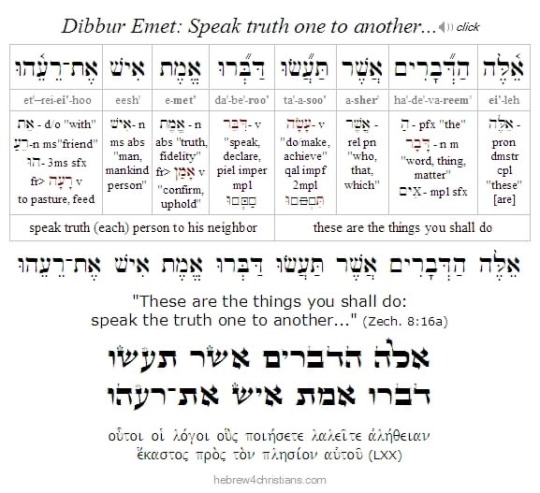
6.6.23 • Facebook
from yesterday’s email by Israel 365
Today’s message (Days of Praise) from the Institute for Creation Research
June 8, 2023
Love, Faith, Joy
“Whom having not seen, ye love; in whom, though now ye see him not, yet believing, ye rejoice with joy unspeakable and full of glory: Receiving the end of your faith, even the salvation of your souls.” (1 Peter 1:8-9)
Peter had seen the Lord, but he was writing to those who hadn’t, including us. Like them, we can have a personal relationship with the Lord, even though we haven’t physically seen Him. “Blessed are they that have not seen, and yet have believed” (John 20:29). Also like them, we can have terrible trials (1 Peter 1:7). Their responses to Christ while in the midst of trials, as given in our text, are likewise appropriate for us.
They loved Him: Love many times makes a trial bearable. “We love him, because he first loved us” (1 John 4:19). “Greater love hath no man than this, that a man lay down his life for his friends” (John 15:13). “Who shall separate us from the love of Christ? shall tribulation, or distress, or persecution, or famine, or nakedness, or peril, or sword?” (Romans 8:35). He loves us too much to abandon us, and we love Him in return.
They believed: “Thou wilt keep him in perfect peace, whose mind is stayed on thee: because he trusteth [or believes] in thee” (Isaiah 26:3). “Blessed is the man that trusteth in the LORD, and whose hope the LORD is. For he shall be as a tree planted by the waters” (Jeremiah 17:7-8). Our faith is well founded.
They rejoiced: “But rejoice, inasmuch as ye are partakers of Christ’s sufferings; that, when his glory shall be revealed, ye may be glad also with exceeding joy” (1 Peter 4:13). The proper response to trials brings inexpressible joy. The end of such faith as explained in our text is the complete and ultimate salvation of our souls, with many victories of faith along the way. JDM
0 notes
Text
REPARATIONS FOR AFRICAN AMERICANS WHO ARE THE TRUE CHILDREN OF ISRAEL, AMEN...
(REPARATIONS) FOR THE CHILDREN OF TRUE YISRAEL
THE MOST HIGH SHALL DELIVER HIS PEOPLE FROM BABYLON-AMERICA WITH MUCH SUBSTANCE, AMEN…
FROM THE KING JAMES BIBLE (KJV 1611)
BY BROTHER J.R.WILLIS
•••INTRODUCTION•••
Shalom dear Zion.
My name is brother Yunathun Zion of the the Tribe of Yudah-Judah.
THE LORD SHALL DELIVER ZION AGAIN WITH MUCH SUBSTANCE-(JUBILEES 14:13-15), FROM NEW SPIRITUAL EGYPT, CHALDEA-BABEL-EDOM-AMERICAN, SODOM & GOMORAH, AMEN:
THE APOCALYPSE-ECSTASY-VISION OF FATHER ABRAHAM CONFIRMED, AMEN:
JUBILEES 14:13-15
[13] And it came to pass, when the sun had set, that an ecstasy fell upon Abram, and lo ! an horror of great darkness fell upon him, and it was said unto Abram: 'Know of a surety that thy seed shall be a stranger in a land (that is) not theirs, and they shall bring them into bondage, and afflict them four hundred years.
[14] And the nation also to whom they will be in bondage will I judge, and after that they shall come forth thence with much substance.
[15] And thou shalt go to thy fathers in peace, and be buried in a good old age.
•••CONCLUSION•••
THE LION OF JUDAH IS COMING TO DESTROY ALL HEATHEN-GENTILE NATIONS, AMEN:
JEREMIAH 4:7
The lion is come up from his thicket, and the destroyer of the Gentiles is on his way; he is gone forth from his place to make thy land desolate; and thy cities shall be laid waste, without an inhabitant.
For Judgement-(DEATH) comes for Esau who is Amalek, who are Edom, which are the Caucasian nations by way of the WRATH OF THE LAMB.
REVELATION 2:9
I know thy works, and tribulation, and poverty, (but thou art rich)-(LORD YASHAYA KNOWS OUR OPPRESSION-AFFLICTION & DESTRUCTION AT THE HANDS OF OUR ENEMIES AS HE HIMSELF ENDURED THEM FOR US-BUT WE ARE RICH BECAUSE WE ARE THE LORD'S HERITAGE-WE ARE THE WORLD & THE WORLD WAS CREATED FOR US),
and I know the blasphemy of them which say they are Jews-(AMALEK-EDOM-THE CAUCASIAN NATIONS), and are not, but are the synagogue of Satan-(THESE WICKED SERPENTS ARE THE CHIEF HOUSE OF THE DEVIL HIMSELF).
NOW WHO SHALL DENY THIS REPORT?
J.R.WILLIS-(YUNATHUN ZION)
AUTHOR: A RACE OF DEMONS REFINED 2017
AUTHOR: SPIRITUAL CRIMES 2018
AUTHOR: THE PROPHECIES
AUTHOR: THE PROPHECIES, BOOK 2
AUTHOR: THE BOOK OF DAEMONOLOGIE YEAR 2020
0 notes
Text
October 22 | Memorial of St. John Paul II, Pope
“Open wide the doors to Christ,” urged John Paul II during the homily at the Mass where he was installed as pope in 1978.
Born in Wadowice, Poland, Karol Jozef Wojtyla had lost his mother, father, and older brother before his 21st birthday. Karol’s promising academic career at Krakow’s Jagiellonian University was cut short by the outbreak of World War II. While working in a quarry and a chemical factory, he enrolled in an “underground” seminary in Kraków. Ordained in 1946, he was immediately sent to Rome where he earned a doctorate in theology.
Back in Poland, a short assignment as assistant pastor in a rural parish preceded his very fruitful chaplaincy for university students. Soon Fr. Wojtyla earned a doctorate in philosophy and began teaching that subject at Poland’s University of Lublin.
Communist officials allowed Wojtyla to be appointed auxiliary bishop of Kraków in 1958, considering him a relatively harmless intellectual. They could not have been more wrong!
Bishop Wojtyla attended all four sessions of Vatican II and contributed especially to its Pastoral Constitution on the Church in the Modern World. Appointed as archbishop of Kraków in 1964, he was named a cardinal three years later.
Elected pope in October 1978, he took the name of his short-lived, immediate predecessor. Pope John Paul II was the first non-Italian pope in 455 years. In time, he made pastoral visits to 124 countries, including several with small Christian populations.
John Paul II promoted ecumenical and interfaith initiatives, especially the 1986 Day of Prayer for World Peace in Assisi. He visited Rome’s main synagogue and the Western Wall in Jerusalem; he also established diplomatic relations between the Holy See and Israel. He improved Catholic-Muslim relations, and in 2001 visited a mosque in Damascus, Syria.
The Great Jubilee of the Year 2000, a key event in John Paul’s ministry, was marked by special celebrations in Rome and elsewhere for Catholics and other Christians. Relations with the Orthodox Churches improved considerably during his papacy.
“Christ is the center of the universe and of human history” was the opening line of John Paul II’s 1979 encyclical, Redeemer of the Human Race. In 1995, he described himself to the United Nations General Assembly as “a witness to hope.”
His 1979 visit to Poland encouraged the growth of the Solidarity movement there and the collapse of communism in central and eastern Europe 10 years later. John Paul II began World Youth Day and traveled to several countries for those celebrations. He very much wanted to visit China and the Soviet Union, but the governments in those countries prevented that.
One of the most well-remembered photos of John Paul II’s pontificate was his one-on-one conversation in 1983, with Mehmet Ali Agca, who had attempted to assassinate him two years earlier.
In his 27 years of papal ministry, John Paul II wrote 14 encyclicals and five books, canonized 482 saints and beatified 1,338 people. In the last years of his life, he suffered from Parkinson’s disease and was forced to cut back on some of his activities.
Pope Benedict XVI beatified John Paul II in 2011, and Pope Francis canonized him in 2014.
Source: https://www.franciscanmedia.org/saint-of-the-day/saint-john-paul-ii
Photo and caption by: Simon Tanjutco
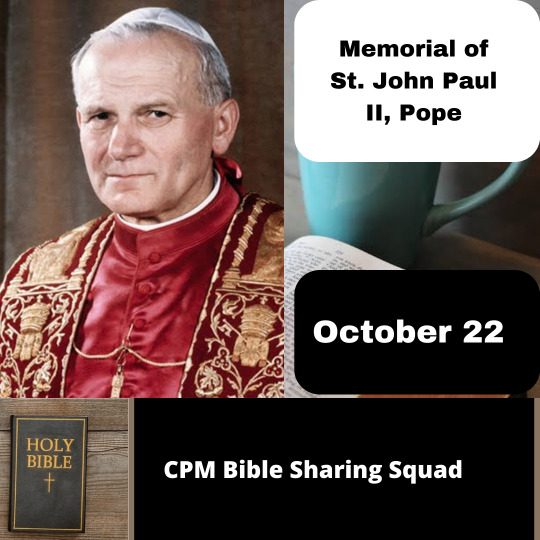
0 notes
Text
https://www.tutorialathome.in/samous-synagogues/jubilee-synagogue-prague-czech-republic
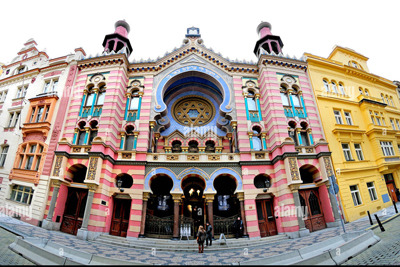
0 notes
